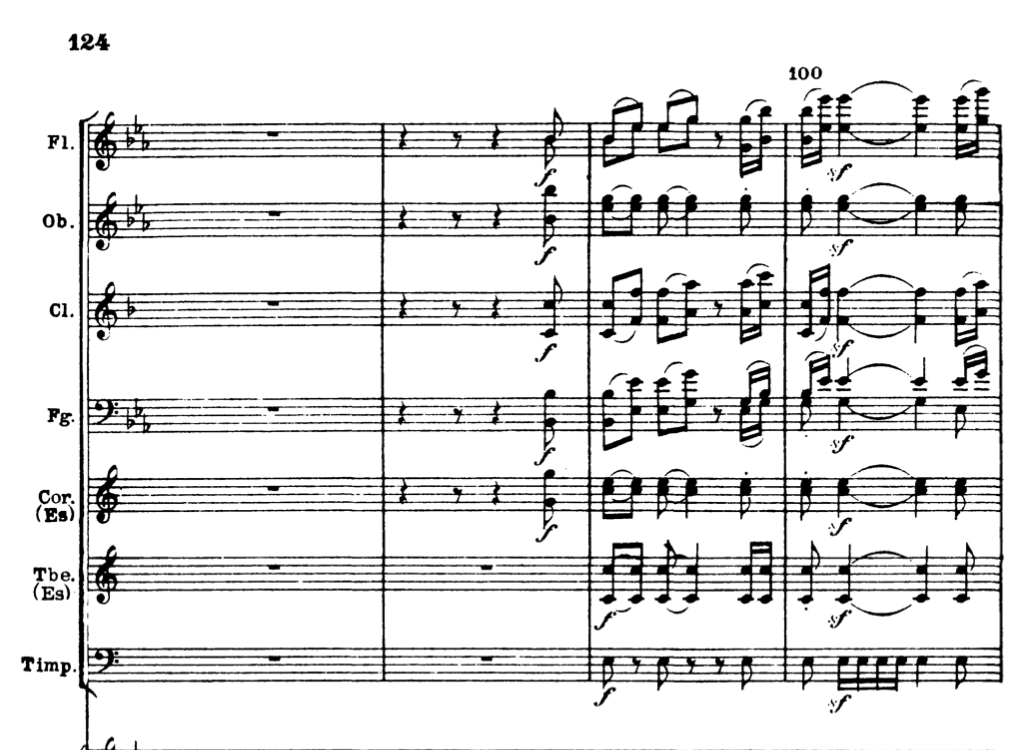Jean-Do Sifantus
Music
There isn't much mention of pop, rock, or jazz so far in this list, maybe because I'm sick of having too many pop tunes stuck in my mind continuously. Which is why I'm trying to force more interesting and complex music into my brain hoping that it will eventually make its way into the part of my brain that's responsible for the tunes that are continuously looping in the background of my consciousness.
TODO Beethoven 5th Piano Concerto
STARTED: <2020-12-23 Wed> COMPLETED:
- Performance by Daniel Barenboim on YouTube
- Amazing phrasing and rubato in the second movement. I thought at first that it was in 6/8, whereas it is in 4/4. And I love the main theme of the third movement, which is in 6/8 with a weird, over-the-bar rhythm, shown below.

Figure 1: Main them of Beethoven 5th Piano Concerto's 3rd Movement
TODO Brahms 3rd Symphony
STARTED: [2021-04-21 Wed 09:40] COMPLETED:
TODO John Adams' Grand Pianola Music
STARTED: [2021-04-21 Wed 09:41] COMPLETED:
TODO Woyzeck
STARTED: [2021-04-21 Wed 09:41] COMPLETED:
- Alban Berg, one of my favorites 20th Century composers
- Wozzeck Opera
- Georg Buchner, who wrote the original novel on which the opera is based.
TODO Audio Programming
STARTED: [2021-04-21 Wed 09:42] COMPLETED:
TODO Music Theory [0%]
It's about time to get back into music analysis, especially Bartok's which I have abandoned since my days at the department of music at UMass/Boston with Larry Berman (not sure of the spelling any more). I got the idea from the 12 Tone channel on YouTube.
[ ]Axis Theory[ ]Paul Wilson music theorist with ideas about the music of Bela Bartok
TODO Shostakovitch Quartets [20%]
STARTED: [2021-05-09 Sun 08:15] COMPLETED:
I started a review of all of Shostakovitch's quartets. When I say review, well in fact I've never listened to most of them. I'm using recordings by the Emerson Quartet because of their beautiful, deep sound even on digital devices and ear pods. Quartets are the purest musical form to experience the combination of harmony and rhythm simultaneously within a single sonic environment, that is, only within the string sonic level, which makes it easier to distinguish the various dimensions – horizontal (melody), vertical (time), and spacial (sonic frequency).
[X]No. 1 in C Major, Opus 49[X]No. 2 in A Major, Opus 68: So far my favorite with the highest level of harmonic sophistication. More accomplished than No. 1. and more representative of Shostakovitch's stylistic patterns.[X]No. 3 in F Major, Opus 73[ ]No. 4 in D Major, Opus 83: The first movement starts with a wild fugue with a Celtic drone. The whole movement, in fact, is very modal.[ ]No. 5[ ]No. 6[ ]No. 7[ ]No. 8[ ]No. 9[ ]No. 10[ ]No. 11[ ]No. 12[ ]No. 13[ ]No. 14[ ]No. 15
NEXT Bartok Quartets [40%]
Same type of review as with the Shostakovitch Quartets also with recordings by the Emerson Quartet on Deutsche Grammophon, except that these versions are not recorded live.
- State "NEXT" from
[X]No. 1, Sz. 40 (Op. 7)[ ]No. 2, Sz. 67 (Op. 17)[ ]No. 3, Sz. 85: One of most Rock'n'Roll of Bartok's quartets with No. 5, especially the second movement with its power chords.[ ]No. 4[X]No. 5
TODO Stravinsky by Leonard Bernstein
STARTED: [2021-05-09 Sun 08:20] COMPLETED:
An article in the N.Y. Times by Anthony Tommasini made me want to listen to the recording set mentioned therein of most of recordings of Stravinsky works by Leonard Bernstein. I was a bit surprised that the set did not include Les Noces even though there is a recording of the piece by L.B. on Sony Classical, I think. CORRECTION: The recording of Les Noces by L.B. I was thinking of is in fact on Deutsche Grammophon. I would love to find the corresponding Norton Lectures that the conductor did at Harvard.
Rhythm Method's Videos
Two videos John found that were recorded in the late 1980s in the studio near the Boston Public Library, I think, where John used to work. I don't remember the name of the place, though. The lineup was as follows:
BSO Thomas Wilkins conducts Coleridge-Taylor, Wooten, and Ellington
- Concert Program
- I got a ticket to this concert at the last minute because I thought the lineup was interesting: a program of African American composition, conducted by an African American conductor, with an African American soloist. Unusual and surprising at the BSO, even though there is a new trend of similar programming in major classical music organizations in the US, e.g., the recent staging of an opera by Terrence Blanchard at the MET, and the eclectic programming of the Los Angeles Philharmonic under Gustavo Dudamel. A similar trend is also going on in Europe where classical music ensembles are increasingly worrying about the aging and scarcity of the attending crowds, even though most European orchestras are state-sponsored organizations. I've noticed a similar trend here either at the BSO or other classical music venues where the audience is largely white, Asian, and older, except for the occasional groups of young music students.
- Mais le paradoxe est que les orchestres maintenant sont nettement meilleurs. La moyenne d'âge a diminué, le modèle hiérarchique c'est adouci sans toutes fois lâcher sa tendance patriarchique. Mais ils jouent maintenant comme ils n'ont jamais sonné, du moins depuis que j'ai eu la chance de les écouter et de les voir jouer depuis l'intérieur en jouant et l'extérieur en auditeur.